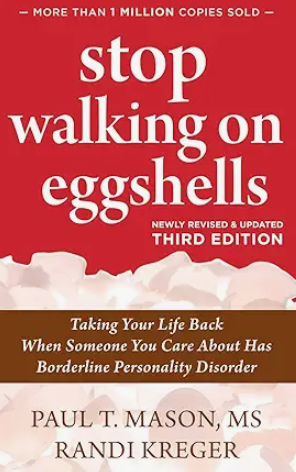The concept of Borderline Personality Disorder is often understood as being synonymous with an impossible individual who acts out in the most ostentatious ways. The concept conjures up images of suicidal threats and acts, as well as intense anger and aggression. However, there is a more subtle kind of borderline anxiety that is less “in your face” and yet quite widespread in many romantic relationships. This kind of borderline phenomenon is not the kind that would require hospitalization, but it nevertheless has its own insidious and very destructive effects on the health of a relationship…
The kind of borderline anxiety I am talking about is different from your common garden-variety of anxiety. It is not related to the fear we can all feel sometimes of messing up an important presentation at work, or the existential fear that comes naturally when having to make an important decision about our life direction. Nor is it related to the everyday anxieties of getting a parking ticket in an area with unclear signage, or the worries about things going wrong that are outside of our control.
These kinds of anxieties are adaptive in the sense that they help us prepare better and consider risks, so that we may make better decisions. Even when these anxieties and worries become excessive and unrealistic, they are still in some sense about external things, and in this sense never pose a danger or threat so fundamental as to reach the level of the anxiety of someone with a borderline personality.
Losing Oneself to Gain Love:
Borderline Personality is in my opinion a fear of being oneself. Not the kind of fear experienced by someone with social anxiety, who may in many instances like themselves when alone and even develop a preference to spend time by themselves.
Unlike the socially phobic individual, the borderline fear of being oneself is paired with a need for others that is as fundamental as the need for oxygen.
This conflict between the need to be close and the fear of being oneself plays itself out in very destructive ways that involve not just the person who experiences these anxieties, but also their partner, who may in many instances end up suffering just as much.
For the person with borderline personality disorder or borderline anxieties, individual expression or being oneself equals loss of love and affection. The fundamental belief here is that “I am unlovable” as myself, therefore to attract and keep the love I need, I must become the object the other person needs or desires. I must obtain love by becoming a chameleon who changes and adapts to become exactly what the other person wants.
Unfortunately, this strategy, although temporarily eliminating the anxiety of being rejected, also leads to built-up of anger and resentment. The person with borderline anxiety soon starts to get annoyed, angry, and frustrated with the lack of love they ultimately receive. They feel loved not for who they are, but for who they have become to please their partner. Although their partner might enjoy having found someone who likes the very things they like or who always wants to go to the restaurants they themselves enjoy eating at, they will soon experience the anger and frustration of their partner who feels chronically love deprived.
Borderline Personality and the Fear of Choosing:
The dilemma, however, is often an impossible one, for if one were to ask the person with borderline anxieties to make a choice about where to go for dinner or where they would like to go on a day retreat, you would soon bump up against the fear of self-expression. To the person with borderline anxieties, making a decision means being exposed and risking rejection. Afterall, we are defined as people by the choices we make, and it is in the freedom of choosing that we cease being an object for another person and start to become a subject or a person in our own right.
The outcome of this dilemma is usually as follows: The person with a borderline personality makes a tentative choice, but now becomes acutely aware of any sign of disapproval. He or she scans the facial expressions and actions of their partner for signs of the loss of love, just like a person who was just robbed, would scan the environment for suspicious people.
The partner is thus often up against a certain paranoia that leads the person with borderline anxieties to attribute motivations, thoughts, and feelings to them on the basis of unfounded fears rather than facts. The borderline is always ready with interpretations such as: he’s just doing it to please me, or she really doesn’t want to be here. And ultimately jumps to the conclusion: He doesn’t care about me! OR she doesn’t love me!
The Impossible Dilemma of the Borderline’s Partner:
A movie night where the person with borderline anxieties has chosen which movie to watch might thus quickly turn into a fight: The anxious person who is already feeling guilty and bad for having made the “choice”, might quickly find a reason to think that the partner is not enjoying the movie, is not paying enough attention, or is using a tone of voice that indicates annoyance with the movie. When accused of this, however, the non-borderline partner cannot persuade their borderline partner otherwise. The conclusion has already been made in the mind of the borderline who now walks up and turns off the video, furious at the partner for the lack of interest shown.
The non-borderline partner is now left with his or her own impossible choice: to insist on watching the movie is to be accused of just humoring the other person, while to do nothing is to prove that every time the other person chooses something, the partner shows no interest.
This kind of scenario where the partner is accused and sentenced on the basis of borderline fears, and feels damned if I do and damned if I don’t, gradually conditions the partner to become fearful or anxious him or herself. He or she may now start to limit their own choices and fear their own self-expression, since it is quite unpredictable when they will incur the wrath of their borderline partner for saying the wrong thing, or making the wrong decision. It is as if by living with someone with borderline anxieties, one has to always walk on eggshells, which by the way, is the title of a popular self-help book for partners who find themselves in these dilemmas:


Borderline Personality and the Fight to Exist:
These kinds of impossible dilemmas, which are now transmitted to the partner, exactly mirror the impossible dilemmas at the heart of borderline pathology: I can’t be myself (without losing love) and I can’t not be myself (without feeling that I don’t exist and am not loved for who I am). I am stuck in the borderland where no choice can be made. My life is an impossible existence, where I am always teetering on the edge of disaster no matter what choice I make.
Borderline personality is thus in most cases a fight to exist, and the emotion that is most symbolic of this fight is: Anger. The person with borderline personality is angry at having to always accommodate others, and angry at having the right to their own existence stolen from them. But they are also angry that if they dare to assert themselves, make choices, and be themselves, the other person likely will lose interest in them or stop loving them.
Anger is here in some sense a sign of health, even if the situation one is angry about is created on the basis of anxiety rather than facts. The anger is a protest. It communicates a desire to be oneself, to have one’s own needs met, and to come into existence as an individual in one’s own right.
About Me: I am Rune Moelbak, a psychologist in Houston, Texas. I provide psychodynamic therapy for people who want to get to the root of their problems.







